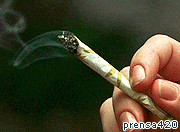Children receiving treatment for cannabis addiction is at a record level, according to latest figures.
Experts are blaming the soar in drug addiction on the popularity of a new stronger skunk, which is several times more potent than regular cannabis.
Meanwhile police officers have been instructed to go soft on people caught using khat – a drug popular among the Somali community – as a ban came into force this week.
Children
More than 13,500 children under the age of 18 received medical treatment for drug addiction last year, with cannabis being cited as the “main problem drug”.
The statistics were released by Public Health England, an executive agency of the UK’s Department of Health.
A spokesman said: “Stronger cannabis strains may be causing more problems.”
Addiction
The figures showed that in seven years there had been a 50 per cent rise in children receiving treatment. The report also revealed that 200 children aged 12 or below were treated for drug addiction last year.
The use of stronger skunk has also been linked to an increase in mental illness.
A spokesman for the charity Cannabis Skunk Sense said: “It’s a scandal that the public isn’t being told the truth about the strength of skunk, which has an alarming 80% of the market.
Psychotic
“One in six teens who try cannabis become addicted and skunk users are seven times more likely to suffer a psychotic episode.”
Treatment for child addicts generally averages 150 days and focuses on counselling and support.
The drug khat, which originates from Africa, has also been made an illegal Class C substance in the UK this week.
Warning
But police officers have been told to respect the culture and history of anyone caught with khat and simply issue a warning for a first offence, a £60 fine for a second and only on the third occasion would users face arrest.
The ACPO policy stated that it is important that “officers retain their operational discretion; taking into account that khat has historically not been a controlled drug and was part of the culture for certain communities linked to the Horn of Africa.”

